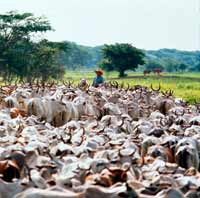EU farm ministers speak out against trade deal with Mercosur countries

EU agriculture ministers have expressed grave concerns about a possible trade deal with the Mercosur group of South American countries, suggesting it will lead to an influx of cheap food that will undercut European farmers and food producers.
The negotiations between the EU and Brazil, Argentina, Uruguay and Paraguay were officially relaunched at a special summit in Madrid on Monday (17 May).
According to a joint communiqué, the heads of state “recalled the importance of reaching an ambitious and balanced agreement between the two regions”.
A first round of negotiation is due by early July, and the leaders “stressed their commitment to strive for a conclusion of the negotiations without delay”. Previous attempts to agree a trade deal first collapsed in 2004 and again in 2006.
The EU Commission maintains that Europe has more to gain from increased access to South American markets for things like telecommunications, financial services and cars, but than it stands to lose from agricultural imports.
Nearly two-thirds of EU agriculture ministers meeting in Brussels this week (17 out of 27) spoke out against the proposed trade deal, which would hit beef and poultry producers in particular.
A note circulated by France – supported by Ireland, Greece, Hungary Austria, Luxembourg, Poland, Finland, Romania and Cyprus – warned that further concessions on agriculture were inevitable and said “this would be unacceptable”.
French minister of agriculture Bruno le Maire also warned of a 75% increase in beef imports and a 25% rise in poultry imports from countries that did not operate to the same high standards as EU farmers.
EU farmers group, COPA also spoke out against the resumption of the Mercosur trade talks, highlighting the environmental impact of replacing European meat with South American meat in the EU market. “It will lead to more intensive farming and deforestation in Mercosur countries,” said a statement.
But Spain’s environment minister Elena Espinosa and EU agriculture commissioner Dacian Ciolos tried to dampen any fears, insisting that special consideration would be given to so-called “sensitive products”.
Previous trade estimates had suggested that EU agriculture could lose out to the tune of €3-€5bn (£2.6-£4.3bn) if a deal was struck along the lines of what was on the table when negotiations originally faltered in 2004.
* For comment on this story, see Phil Clarke’s Business Blog
